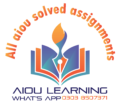Course: Educational Psychology and Guidance (6501)
Semester: Spring, 2022
ASSIGNMENT No. 1
Q. 1 Psychology is the science of mind; Psychology is the science of behavior, comparatively discuss these schools of thoughts and explain concept of psychology in your own view.
Psychology is the study of mind and behavior. It encompasses the biological influences, social pressures, and environmental factors that affect how people think, act, and feel.
Gaining a richer and deeper understanding of psychology can help people achieve insights into their own actions as well as a better understanding of other people.
Psychology is a broad and diverse field that encompasses the study of human thought, behavior, development, personality, emotion, motivation, and more. As a result, some different subfields and specialty areas have emerged. The following are some of the major areas of research and application within psychology:
- Abnormal psychology is the study of abnormal behavior and psychopathology. This specialty area is focused on research and treatment of a variety of mental disorders and is linked to psychotherapy and clinical psychology.

Q.2 Critically discuss different stages of physical and cognitive development from birth to adolescent. Explain the role of environment in this process.
Jean Piaget’s theory of cognitive development suggests that children move through four different stages of mental development. His theory focuses not only on understanding how children acquire knowledge, but also on understanding the nature of intelligence.1 Piaget’s stages are:
- Sensorimotor stage: birth to 2 years
- Preoperational stage: ages 2 to 7
- Concrete operational stage: ages 7 to 11
- Formal operational stage: ages 12 and up
Piaget believed that children take an active role in the learning process, acting much like little scientists as they perform experiments, make observations, and learn about the world. As kids interact with the world around them, they continually add new knowledge, build upon existing knowledge, and adapt previously held ideas to accommodate new information.
Piaget was born in Switzerland in the late 1800s and was a precocious student, publishing his first scientific paper when he was just 11 years old. His early exposure to the intellectual development of children came when he worked as an assistant to Alfred Binet and Theodore Simon as they worked to standardize their famous IQ test.

Q.3 Evaluate Psychosocial Crises theory by Erik Erikson. What are the major implications of this theory for teaching learning process?
· To study changes in individuals over time, developmental psychologists use systematic observation; self-reports, clinical interviews, or structured observation; case studies; and ethnography or participant observation.
· Three common research methods are the experimental method (which investigates cause and effect), correlational method (which explores relationships between variables), and the case study approach (which provides in-depth information about a particular case).
· Regardless of whether studies employ the experimental, correlational, or case study methodology, they can use research designs or logical frameworks to make key comparisons within research studies.
· Common research designs include longitudinal, cross-sectional, sequential, and microgenetic designs.
Developmental psychology employs many of the research methods used in other areas of psychology; however, infants and children cannot be tested in the same ways as adults. To study changes in individuals over time, developmental psychologists use systematic observation, including naturalistic or structured observation; self-reports, which could be clinical interviews or structured observation; clinical or case study methods; and ethnography or participant observation. Three research methods used include the experimental, correlational, and case study approach.

Q.4 Evaluate the concept of Master Learning. Explain the ways to ensure and assess mastery learning in teaching learning process.
Concept learning describes the process by which experience allows us to partition objects in the world into classes for the purpose of generalization, discrimination, and inference. Models of concept learning have adopted one of three contrasting views concerning category representation. In prototype theories, the concept learning process is assumed to yield an abstract representation corresponding to the central tendency of the category exemplars on each of the dimensions of variation. In exemplar models, the concept is simply the set of mental representations of all of the category exemplars that have been previously observed, with each instance assumed to be stored as a separate trace. In decision rule models, the learner is assumed to construct a boundary or rule in psychological space which partitions it into different category regions. These different models, and some of the evidence supporting each of them, are considered in turn. Next, the role of selective attention in categorization, and the way in which the different models deal with selective attention, is discussed. Evidence that categorization may be controlled by multiple mechanisms is evaluated, and finally the fine-scale dynamics (i.e., time course) and some aspects of the neuropsychology of categorization are reviewed.
Q.5 Comparatively discuss the role and implications of cognitive and associative theories of learning.
It appears to be a simple task to define what we mean by the term learning. After all we have spent our entire lives learning new things. When asked to provide a definition of learning we usually offer such responses as:
· Knowing something you didn’t know before.
· Gaining knowledge and skills.
· Acquiring information that you can use in new situations.
· Benefiting from instruction.
· Developing your intelligence.
· Acquiring a different perspective on the world.
Learning as a phenomenon has always fascinated people in many different disciplines, and there are many theories and thoughts about what learning is. Learning is relatively permanent change in mental processing, emotional functioning, and/or behavior as a result of experience.
Learning is the process of understanding, clarifying, and applying the meaning of the knowledge acquired. Furthermore, it can also be an exploration, discovery, refinement, and extension of the learner’s meaning of knowledge. Overall, learning occurs when an individual’s behavior or knowledge changes.
Learning has also been defined from the perspectives of two major bodies of learning theory to explain how people learn: behaviorism and cognitivism.




